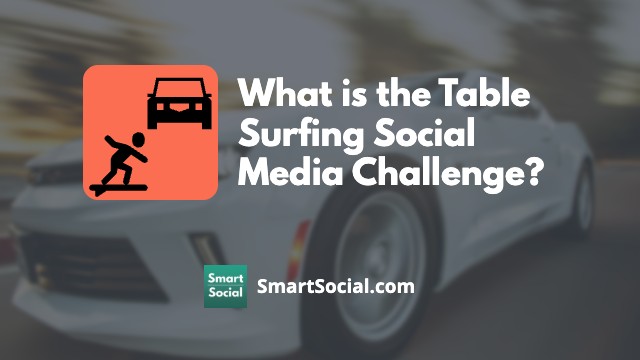What to Look for When Researching Social Media Apps for Your Students
Green Zone App
(Click here to learn more)
Dangerous Social media challenge
(Click here to learn more)
Red Zone App
(Click here to learn more)
Gray Zone App
(Click here to learn more)
New social media apps are added to the Google Play and Apple App Stores every day and controversial apps are often removed only to be re-added to the stores months or years later.
With all of these additions, how can parents and educators:
- Stay informed of what apps their student is using?
- Understand what makes students want to be on the apps and what they are doing on those apps?
- Know the dangers of using the apps?
The SmartSocial.com team spends hours every week researching and listening to parents, educators, law enforcement officers, school districts, teachers, and students.
We create and edit the SmartSocial Parent App Guides based on real questions we get from parents and educators all over the world. Our answers are based on in-depth research about what each app does, how it works, and hidden features parents and educators might not know about (but students do know about).
We are always watching social media and tech news to stay on top of what dangers the popular apps have created for their users.
Parents and educators can do the research themselves, but our mission is to help keep students safe online, so we share our Parent App Guides, for free, for all parents and educators.
Why should parents research social media apps?
- There is no safety resource that is better at protecting students than knowing about and using the same apps students are using
- Being willing to learn about new apps is the starting point to having an open dialogue between adults and students (adults don’t have to post a video of themselves dancing on TikTok or a revealing Tweet about their day to get to know the apps)
- Apps can create “hidden” or harder to find features to help users hide their activity
We want to help parents and educators build trust with their students and to teach students how to spot danger, make smart decisions, and get help from a trusted adult if they make a mistake or feel uncomfortable online.
“Why not ‘just’ install parental software?”
- We believe there is no safety resource better at protecting students than having trusted and involved adults in their lives
- No software exists that can monitor every app, on every device, in every way that students, or predators, use the programs
- Some of the most popular apps don’t allow monitoring software to access all the information and other apps are created specifically to make messages “disappear” after the user sees them. Some apps make it difficult to even share an account between a parent and a student so both the student and parent could both see the messages when they come in
- Working together to learn and experience an app’s functionality leads to dialogues between students and parents about dangers and risks, making good decisions, and positive use opportunities
Is SmartSocial.com credible?
How we conduct research (and you can too)
- We spend time using the app, connecting with our family, friends, and strangers as students would do
- We talk with students about how they use the app and research the dangers and concerns that have already been reported by parents, educators, psychologists/counselors, and technology experts
- We look for “hidden” parts of the apps where students might hide their activity
- We look at every feature and setting in the app, especially privacy-related settings that may access the user’s location using the phone’s GPS services
- We try the instant messaging/chat features and posting/comments that connects users with known friends, followers, or strangers
- We scour credible news sources from around the world for real-life stories about the apps
What we look for in apps
- Many factors influence how safe an app is or how easily strangers can contact your students
- We look at how the app developers or companies market their products and what promises they make
- We look for how users sign up for the app and if there are age restrictions and/or verification steps to sign up
- Our team looks for the incentives or gamification that create pressure for users to excessively use the apps
- We consider what permissions the app asks for from users when installing
Social media challenge research (real and fake trends)
- Hashtags allow social media users to follow or find posts of similar topics they are interested in
- Social media challenges often use hashtags to challenge the users to complete a tasks, or series of tasks, and then to share the video or pictures on social media with the hashtag
- Many social media trends are dangerous because users don’t think about safety and just want to get views or likes, or think they can do dangerous stunts better than other users they have seen attempt them
- Some social media challenges are truly fake, but it can be easy for anyone to believe something if they see it often enough
- In our experience, some social media challenges (like the Blue Whale Challenge) can start off as a hoax but then gain attention online, which encourages students to take the challenge seriously
- Learning about viral social media challenges before, or at the same time as your student can help you continue the dialogue with them about social media and help them make the right decisions when you are not looking
Why “no” isn’t the answer even when there are dangers out there
- Students will find a way to get access to the apps or content they want to see, with or without parents’ permission. Being involved will help them use the apps in a safe way
- Every app has the potential for leaving a lasting impression on a student’s online footprint, even if the app promises the messages or posts “disappear" after a set amount of time”
- When deciding if an app is right for a student, parents and students must consider the potential of how each app might impact a student’s online presence now and in the future and have a plan of how to set it up for a positive footprint. The SmartSocial Popular Teen App List Green Zone Apps can be a great starting point to create a positive online footprint
How to request a specific new SmartSocial Parent App Guide?
- Our app guides are based on the needs of parents and students and the latest information we find about the apps
- If you don’t see your questions answered, let us know! We need your input to hear what your students are experiencing as technology changes so quickly
- The easiest way to get in touch with us is to respond to any of our weekly newsletter emails or go to: SmartSocial.com/contact
How can I get more information about apps when I need it?
- We are always adding and updating app guides. Subscribe to the SmartSocial newsletter for updates delivered to your email twice a week!
- Do you have a question while on the go or while talking with other parents? Download the SmartSocial app for quick access to our research
- Subscribe to the SmartSocial podcast on your favorite podcast service to get audio versions of our app guide updates as they become available
The SmartSocial Very Informed Parent (VIP) program gives adults and students in-depth information about how to use the apps, reviews of what others have to say about the app, and step-by-step walkthroughs on how to save settings to keep users safe
Protect your family and enter for a chance to win cool prizes
Become a member or log in to learn more on this topic
Protect your family and enter for a chance to win cool prizes

., start learning from this page to earn points!*
Hello, I'm Josh, the founder of SmartSocial.com.
Don't leave this page until you fill out our feedback form that will appear after you learn from the resources...
Here are some of the latest resources at SmartSocial.com
Become a Very Informed Parent (VIP) to get our social media suggestions in your email every Tuesday & Thursday.



Hello, I'm Josh, the founder of SmartSocial.com. Protect your family by taking my 1 minute quiz
This quiz will help you understand how safe your family is


Schools & Districts: Partner with us to protect your community online
Our remote presentations (and website) teach over a million parents and students each year how to be safe so they can shine online. We teach students how their accounts can be used to create a portfolio of positive accomplishments that impress colleges and employers.


Join Our Smart Social Podcast
each week on iTunes
With over 500 episodes, Josh Ochs interviews psychologists, therapists, counselors, teachers, and parents while showing you how to navigate social media to someday shine online.
Listen on:



.jpg)
.jpg)

.jpg)


